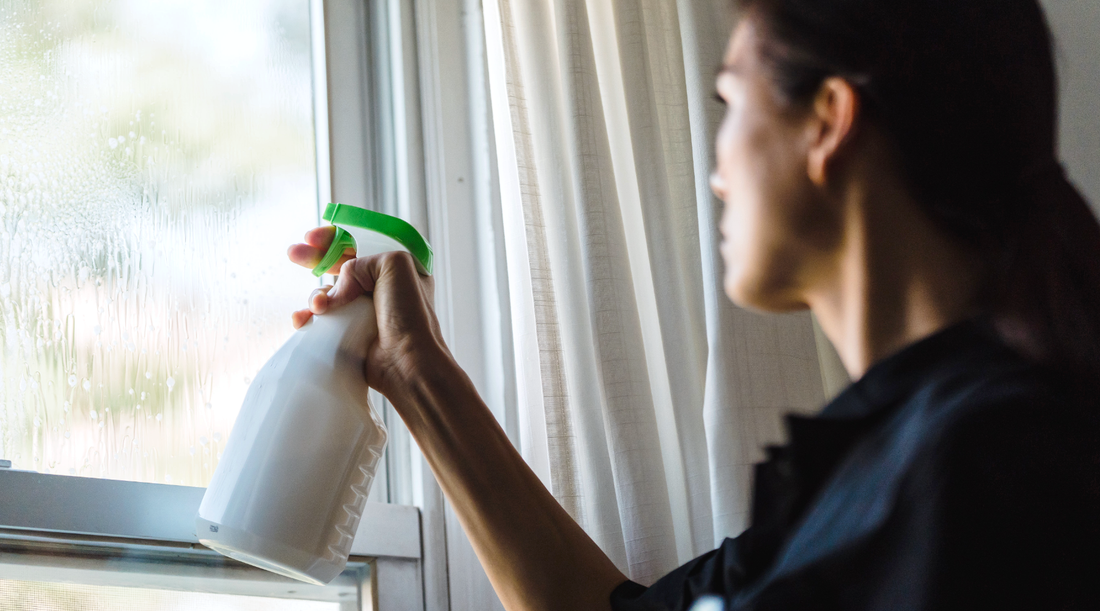
Myth #1- Window Cleaners Pose Health Risks
There’s no denying that some of the mass produced window cleaners contain chemicals that have been linked to health problems. However, in recent years, a lot of focus has been placed on developing safer alternatives that keep your family safe from toxins and are more environmentally friendly as well. The key to purchasing a window cleaner you can feel good about is learning what to steer clear from and making it a habit of reading labels. Additionally, a quick internet search will give you a variety of cleaner recipes you can make yourself, usually with items found in your kitchen. Not only are these DIY cleaners simple to make, they are safe, more cost-effective and give comparable results to the mainstream choices on store shelves.
Myth #2 Streak Free Windows Require Specialty Cleaners
This myth can be chalked up to impressive marketing and is absolutely unnecessary. While the products that advertise “streak-free” results may actually work, they are far from necessary. In all honesty, streak free windows are easy to accomplish when you have the proper tools and learn the best methods. And, in regards to cleaners, most window cleaning professionals mix their own cleaning solutions made of dishwashing liquid and distilled water, which is void of minerals that can cause spotting.
Myth #3 Newspapers Produce the Best Streak Free Results

While drying windows with newspapers may have worked great for older generations, nowadays the chemicals used in the mass production of newspapers may actually damage windows. Also, contrary to the days of your grandparents when newspapers were printed on much thicker paper, today’s version is thin and simply doesn’t hold up in moisture, much less cleaning solutions. For optimal streak-free results opt for the reusable, long-lasting MicrofiberMagic cloth. Not only will it give windows that finished sparking touch, there’s no lint or film left behind as with rags, cloths, or paper towels.
Myth #4 Rain Is Good and Bad for Cleaning Windows
As you probably guessed, there are myths floating around about rain being both good and bad for cleaning windows. It just depends on who you ask! But, neither are truly correct. While rainwater is naturally purified, it neither cleans or dirties windows on its own. In regards to the belief that it makes windows dirty, the fact is, when rainwater mixes with existing dirt, then windows may indeed look worse after a rain. As for rainwater alone cleaning windows, it simply can’t wash away the buildup of dirt and debris that occurs on exterior glass from weather elements. Just as water spots develop on a freshly washed car that isn’t buffed, sparkling clean windows require excess water droplets be whisked away and dried with a squeegee and/or cloth.
Myth #5 Don’t Clean Windows on a Sunny Day
This myth actually has a bit of truth to it, because cleaning windows on a hot sunny day can increase the likelihood of streaks or a film being left behind. These unwanted results are due to the cleaning solution drying from the heat before you’re able to wipe it off. Although most professionals opt to clean windows when its overcast or at least avoid the peak hours of sun and heat, by taking a different approach, you can still get your windows cleaned the first time on a hot sunny day. Rather than wetting a large portion of the glass, work in smaller sections so you’ll have ample time to properly dry the window before the sun does.
Myth #6 Skip Cleaning the Entire Window and Simply Spot Clean
Spot cleaning windows to remove a fresh smudge or splatter can help keep windows looking better in-between a full-fledged window cleaning, but isn’t a replacement. In fact, it’s recommended that windows be routinely cleaned 2-3 times each year, depending on where you live. Think of it as another item on your checklist for maintaining your home. Interior windows accumulate residue over time, whether from cooking oil, residue from burning candles or essential oils, or even spraying perfume, deodorizers, or hairspray. As for the exterior glass, it is exposed to various things including pollen, bird droppings, and mold or mildew, depending on the climate. Leaving these things on windows have the potential to permanently damage the glass and the framing as well.
Myth #7 Hot Water is a Must When Cleaning Windows

While warmer water works better than cold to help activate the cleaning agents that help dissolve dirt on the windows, scalding hot water isn’t necessary. If you prefer to use higher temperatures be sure it’s not so hot that it burns your skin. Lukewarm is a great place to start!
As you can see, some of these myths do hold a bit of truth, but bottom line, window cleaning isn’t that difficult. With the proper tools and using the right techniques, you’ll enjoy sparkling clean windows and just might discover that it’s not the dreaded, tedious chore you once thought.


